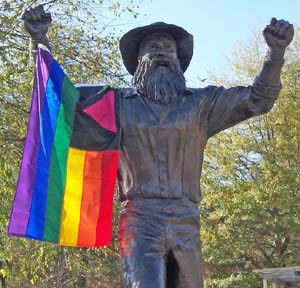Appalachian State University LGBT Life
Based in Watauga County, North Carolina, Appalachian State University (Appalachian) dates to the early twentieth century when it was established as a co-educational public institution to improve the quality of mountain teachers. [1] Being a historically conservative teachers college embedded in a progressive town within a traditional, rural Appalachian county has affected the individual expressions of sexual and gender identities.
The Appalachian lesbian, gay, bisexual, and transgender (LGBT) experience has evolved from a universal secret to open acknowledgment by many faculty, staff, and students. With its campus members nicknamed the “Appalachian Family” in 1955, the institution at the time maintained social control by acting as a parental substitute and resisting the liberalization of sexual mores until Appalachian followed national trends of retracting in loco parentis policies in the 1970s. Campus members developed a nurturing, congenial atmosphere that at the same time silently frowned upon open expression of sexual and gender diversity – like many families.
The historical stigmatization of non-normative sexualities and genders kept LGBT Appalachian campus members underground, forming clandestine friendship groups for most of the university’s history. LGBT-supportive institutional resources gradually developed expanding the toleration of campus members who live openly LGBT lives. Now entering its second century, Appalachian has a lesbian, gay, and bisexual counseling group, a transgender support group, semi-annual drag shows, an annual Queer Film Series, two student organizations that specifically address sexuality and gender identity, an unofficial LGBT faculty/staff organization, a safe zone program, an LGBT Center, LGBT studies courses, a transgender-friendly housing policy, soft benefits for domestic partners of employees, single-use bathrooms in all newly constructed buildings, and an Equal Employment Opportunity policy which includes sexual orientation and gender identity and expression. As a result, Appalachian stands out as one of the most progressive universities in the University of North Carolina (UNC) System.
Because of the historically conservative nature of the area and college and the larger context of the South, Appalachian’s apparent lack of administrative-led, homophobic witch hunts and its state leadership in pro-LGBT policies make Appalachian an excellent sample for a study on organizational reactions to LGBT populations in rural areas. LGBT campus leaders and national trends influenced the school’s administrative mitigation between conflicting local traditional sexual mores and the national LGBT movement’s goals; thus, how the administration massaged policies affected the community’s reaction both to Appalachian’s LGBT populations and to the LGBT campus experience.
Pages
- User:Boone
References
- ↑ To lessen confusion, the school’s contemporary name or the term “Appalachian” will be used when referring to Appalachian State University and its various incarnations. Its various names and respective dates are Watauga Academy (1899-1902), Appalachian Training School for Teachers (1903-1924), Appalachian State Normal School (1925-1928), Appalachian State Teachers College (1929-1966), and Appalachian State University (1966-present).
|| | | | | | | |
